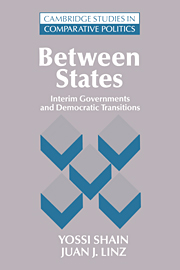Book contents
- Frontmatter
- Contents
- Preface
- Contributors
- PART ONE THEORY
- Introduction
- 1 Provisional governments: Revolutionaries and moderates
- 2 The power-sharing model
- 3 The caretaker government model
- 4 The international interim government model revisited
- 5 The timing and nature of first democratic elections
- 6 Conclusions
- PART TWO CASE STUDIES
- Index
2 - The power-sharing model
Published online by Cambridge University Press: 05 August 2012
- Frontmatter
- Contents
- Preface
- Contributors
- PART ONE THEORY
- Introduction
- 1 Provisional governments: Revolutionaries and moderates
- 2 The power-sharing model
- 3 The caretaker government model
- 4 The international interim government model revisited
- 5 The timing and nature of first democratic elections
- 6 Conclusions
- PART TWO CASE STUDIES
- Index
Summary
Revolutionary and postwar provisional governments must be distinguished from interim authorities which are the product of ad hoc coalitions between the democratic opposition and the outgoing regime and from incumbent administrations (or their heirs) which have declared themselves caretaker until a democratically elected government can take charge. In general, interim governments based on power-sharing coalitions are more likely to be initiated when the period prior to their formation is not overshadowed by large-scale violence, and when the opposition is not controlled by a revolutionary elite or ideology. Such conditions permit both the opposition leaders and the incumbent elite to go beyond retribution toward accommodation. Transitional moderation, however, may only reflect tentative political calculation, and it is reasonable to expect outbursts of zeal for evening the score after the first democratic elections.
For analytical purposes one must distinguish between interim governments based on a power-sharing formula and negotiated “pacts.” The two differ in their objectives and scope. The term “pact” in the literature on regime transition refers to a wide set of negotiated compromises among competing elites with long-term goals of accommodating conflicts and institutionalizing the distribution of power in key aspects of state and society. Such compromises may be obtained within a power-sharing government as well as in situations where incumbent caretaker governments lead the transition. Pacts are unlikely to develop under a revolutionary provisional government.
- Type
- Chapter
- Information
- Between StatesInterim Governments in Democratic Transitions, pp. 41 - 51Publisher: Cambridge University PressPrint publication year: 1995
- 1
- Cited by

